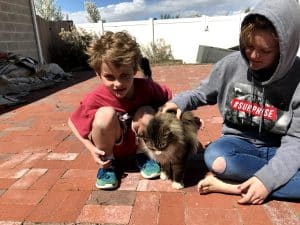This month I took my son to The Wild Robot in the theater. The book by the same title was my little boy’s favorite for several years. He just turned thirteen and is growing up fast.
The main character Roz is the ideal robotic domestic servant. She is designed to cheerfully go about “increasing free time and happiness by 40%” for whatever human(s) might purchase her. She and identical robots are shipped off to be sold on a consumer market. During a storm, a cargo ship carrying Roz is capsized and her crate is thrown to the shore of a rocky, forested island. Curious otters accidentally activate her. Roz boots up and eagerly searches for a consumer to give her tasks among the confused animals.
After an unpleasant encounter with a bear, Roz stumbles off a cliff and falls on a goose nest, crushing two goose parents and all but one of their eggs. She carefully collects the surviving egg. It soon hatches, and the gosling imprints on her and starts following her everywhere. Roz is advised by the island’s animals that she now has an important series of tasks. She has become an adoptive parent and must feed the gosling, help him learn to swim and fly, and make sure he takes his first migratory flight in the fall. Roz’s gosling, Brightbill, is a runt, making these tasks more challenging, and she also learns that if he doesn’t learn to fly and take off with the other birds, he likely won’t survive the winter.
Roz accepts her new responsibilities, but she’s clueless and makes a lot of mistakes. She’s eager to get the tasks done as quickly and efficiently as possible. She tries to feed her gosling a pinecone. She blasts his tiny body into the air trying to help him learn to fly. She shoots him into the water with no preparation or support. Trying to rush and force success gets her nowhere.
Just as Roz starts to gain some wisdom and competency as a parent, things become more challenging. Brightbill learns the truth about the origins of their relationship, that is, how Roz accidentally crushed his parents. He resents what happened, as well as how being raised by her has made him socially awkward and snubbed by other animals, especially his own kind. He starts turning away from Roz.
Desperate for help processing all this, Roz boots up a fellow, mostly corroded robot from a storm-tossed crate to have someone to help her process her situation. The robot accesses Roz’s drives and detects that she has overwritten her own programming. The less experienced robot is alarmed, and starts to treat Roz as defective and off-course.
But Roz has already grown out of such frameworks for thinking about herself. “I’ve been overwriting my programming for months now,” she asserts with frustration. She explains that has had to overwrite her instructions in order to have any hope of accomplishing her tasks. The more she pushes Brightbill or tries to force progress, the less he trusts her. Roz is learning that relationships and personal growth are much more complex than her programming accounted for. She was made for straightforward tasks, but ended up with the challenges of intimate and emotional parenting work.
As Roz said, “I’ve been overwriting my programming for months now,” I started to cry in the theater and began to the relate to the film on a whole new level.
I was programmed to be a certain kind of task-oriented domestic servant to the Church. Having children and keeping them fully anchored in the faith were the major objectives set for me by others. And the stakes the Church set for me couldn’t be higher: eternal happiness and salvation for me and for them. It has been treated as mandatory to make sure children adhere to the Church’s teachings and live its standards–to launch any boys off on missions, and make sure all children were sealed in the temple. To make sure they conform to the Church’s teachings, standards, and objectives for them. But like Roz, how I was conditioned wasn’t well-suited to the real needs of being a parent.
Roz is aware that when things go wrong, she is mandated by her manufacturers to send out a signal so they can collect her and correct her malfunction or damage. But as she experiences life with Brightbill, Roz loses confidence that such an act will be rewarding or even the right thing to do. She recognizes that the obedience and task-fixated programming made being Brightbill’s caretaker and interacting with the island’s wildlife dangerous for everyone involved. Her programming was not in her own interest, her child’s or her neighbors’. Obnoxious marketing techniques integrated into her behaviors such as pinning “potential customer” stickers on others were designed only to benefit her manufacturers and their bank accounts.
Roz comes to fully think and act for herself and even to rebel against her manufacturers. As Brightbill takes his flight away from the island, they both see that their months together (while rough and confusing) have led to a strong and caring attachment to each other. Both have sacrificed greatly to make their relationship work. Although Roz originally planned to return to her manufacturers after completing her task to launch Brightbill in his migratory flight, she chooses to stay on the island, wait for his return, and to become a permanent resident. (When they are finally reunited, and exchange the words “I love you” for the first time, I could hear that I was not the only one crying in the audience). Roz deliberately overwrites obedience and loyalty to her manufacturers with family loyalty and love. She’ll no longer be a servant to those who assert authority over her for their own use. She’ll be a protector for her adoptive child and the wildlife in her home. She actively, physically fights her manufacturers when they come try to collect her.
I’ve been overwriting my programming for years now. Ever since I’ve had adolescents, they have been challenging things I was taught to strictly uphold. I was programmed to be content in a patriarchal system, even to believe that this was the sacred and unquestionable will and order of God. My children’s pain and difficulty living in that system led me to overwrite that programming. I was programmed to trust the church’s lead on moral issues and let them call the shots for me, including concerning the intersection of queerness and faith. Yet my kids as well as young adults I work with imploded my assumptions and led me to become more humble and open about this. I was programmed to show disapproval of my children if they didn’t adopt Latter-day Saint doctrines, lifestyles, and goals, even to reject and disown them to a degree when this happened. I felt programmed to make our relationship about them pleasing me by conforming to religion. But my interactions with my children revealed that this programming was manipulative, unloving, and even anti-family.
My programming didn’t help me to know what to do when my children were skeptical and questioning, or when they experienced dissonance with church teachings and policies, or felt judged or controlled by leaders. My programming made me anxious and controlling and forceful about belief, standards, and religion. This consistently just made things worse. My programming wasn’t in my best interest. Nor was it in my children’s best interest. It was dangerous to our relationships and to my children’s psychological and spiritual well-being. It seems now like it was meant to benefit someone else. While I trust there are many good intentions to help people have spirituality among the Church’s directive team, it nevertheless feels like all this undue pressure to keep my children fully active in the church was really mostly about having more tithe-paying, mission serving members to populate the Church and support the goals of those at the top. That it was really about the institution’s anxiety about its own survival rather than about heavenly or spiritual things. Our theology has beautiful and transcendent pieces but teachings about the three degrees of glory and what it takes to be eternally safe and united in the one most optimal place, as well as teachings about us being the one true Church and the only path to God yields so many rotten and toxic fruits in our emotional lives and family relationships.
At Church, I’ve found my children haven’t been taught to swim or fly in the gospel gradually or with sufficient compassion. It has often been a throw-you-in, sink-or-swim kind of experience. If kids can’t hack it, won’t believe one thing or another, or aren’t committed to the normative covenant path and mission checklist here and now at age 12 or 15, they often feel out of luck. They are quick to sense they don’t really belong in the Church and are not right with God in others’ minds. Lately, the Church often takes a robotic, efficiency-driven, heavy-handed, corporate approach to passing down our faith heritage instead of doing the hard work of mentoring kids and meeting them where they are actually at. “Covenant path” messaging is frequently experienced as oppressive and suffocating rather than inspiring or joyful. Our youth mentoring is sometimes actually anti-growth and anti-spiritual. A friend recently told me that her young adult left the Church because even though his youth leaders were decent enough and cared about him, he weighed the balance, and the religion’s approach to life tore him down more than it built him up.
As an independent-thinking parent, I have become like Roz, a Wild Robot. Taught to be conformist, obedient and task-oriented, I’ve written hard-earned wisdom over my old hard drive. Differentiated spiritual experiences and interpretations cover my soul like the moss and lichen that grow on Roz during her time on the island. I’m no longer interested in serving and pleasing religious authorities for the sake of doing so. They underestimated my capacities and willingness to claim independence and adapt to adversity. These authorities also miscalculated how much my loyalty toward the institution could diminish if they failed to provide my children with a spiritually healthy, accommodating, and loving experience in the Church.

I’m still involved in Church because God’s love, my personal spirituality, and spiritual community are all really important to me and I want to pass down faith and spirituality to my kids. But now my kids’ well-being and family life comes first. I’m not afraid of being different, disagreeing with those who try to assert authority over me, or carving out space for my kids to show up as themselves. Will I complete the checklist? While I would be happy for my children to benefit from Latter-day Saint faith and spirituality as much as I have, and while I role model this, I see that their personal choices of religion as future adults are out of my control. This is not actually my task.
What faith and spirituality boil down to (that actually matters) is loving connection with something greater than ourselves. If the Church fails to offer that in their lives, they probably aren’t going to launch in this community. While I am a believer, I honestly don’t know if I would want them to if they don’t feel love and belonging and peace in the Church. Roz’s successful launch of Brightbill into goose society only works out because the geese who once snubbed and mocked him humble themselves and learn to embrace him and his differences. (Will a similar loving adjustment that includes kids who don’t easily believe or belong ever be made in our institution?) If my kids don’t feel at peace or at home in Mormonism, I will help them nonetheless in building a satisfying and meaningful adulthood according to what they perceive is best for them.
My actual job is fostering loving and healthy relationships in which we can talk honestly and respectfully about things that are important to us. Like Roz, here I am trying to become competent and wise as a parent in complicated times. I’m trying to help my children swim and fly in life, catching them when they fall. Without pushing, I’m inviting them to stay open to ways spirituality can enrich their lives. I’ve learned at work that children pretty consistently uphold some of the values and principles that their parents lived me once they are adults themselves. It might not be anything we directly teach them–it is what we sincerely live by and care about. They might not participate in the same religion, for example, but intergenerational spiritual values are persistent. This gives me hope that my children will be resilient and know how to build a centered, loving life guided by good principles as I try to live this way myself.






3 Responses
Beautiful. This resonates!
I love these thoughts. Thank you
Oooo, now I want to see this movie. The trailer didn’t get me excited, maybe because the animation style reminded me of Zootopia and I was hoping for something closer to the book’s illustrations. I’ve read (and loved) the book, so I didn’t want to ruin it.